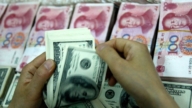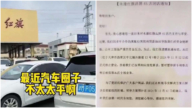【新唐人2014年03月01日讯】人民币兑美元上个月突破6.04,创了历史新高,正当人们期待“破六”时,人民币汇率开始了狂跌。短短10个交易日,人民币对美元中间价跌至6.165093,跌幅超过了2%,而去年全年人民币涨幅也仅有2.9%。处在狂降时期的人民币,是否是安全的投资币种?请看报导。
对于近期狂跌的人民币,27号,美国的《华尔街日报》引述熟悉中国央行人士的话表示,央行主导了近期人民币的下跌,目地是让投机者出局。
《华尔街日报》还根据交易员们的消息说,央行还指示国有银行买入美元,以此干预外汇市场。
《华尔街日报》的报导并不是空穴来风。
在2月16号,中共央行召开了为期两天的人民币业务会议,会后央行发布一则声明:央行决定打击人民币单边升值的预期,抑制投机交易。
在会议结束后的第二天,也就是2月19号,人民币开始了这轮的狂降。
港媒指出,19号早盘交易中曾有至少两家中资大行出价购入买美元,使美元价格急升。
大陆金融分析师任中道:“中共一直在操纵汇率,央行每天给一个参考汇率,然后每天跌幅不超过1%。其实汇率的涨和跌完全处于中共的手里面,它可以来控制这一切。”
其实,早在2012年,约三个月内,中共央行也把人民币贬值1.5%左右。
不过,根据外汇局最新公布的统计资料显示,今年1月份,银行结汇达到12412亿元人民币,等值2033亿美元,售汇为7937亿元人民币,等值1300亿美元,结售汇顺差达4475亿元人民币,等值733亿美元,环比大增1.3倍。
这说明1月份仍有大量热钱流入。
而非盈利研究机构全球金融诚信(Global Financial Integrity)的研究显示,去年有接近1000亿美元资金,通过伪造出口发票,潜入中国,这些资金进入中国后流向高息贷款、房地产等领域。
美国“南卡罗莱纳大学艾肯商学院”教授谢田认为,目前房地产的升幅还是远大于汇率的贬值。去年,中国的平均房价上涨了9.5%,所以,只要房地产的泡沫不灭,热钱仍有套利的空间。
美国南卡罗莱纳大学艾肯商学院教授谢田:“而实际上这些热钱本身,我们知道很多是中共自己的钱,中共权贵自己的钱在转了一圈又流回来。”
谢田指出,长久来看,房地产泡沫一定会破灭。一旦破灭,人民币大幅度贬值就无法避免。
《华尔街日报》还报导说,目前中共正计划改革金融业,提升人民币的地位以挑战国际货币美元,而汇率市场化改革是计划的一部分。
报导还引述熟悉央行人士的话说,央行正试探市场,以便为放宽人民币交易区间做准备。并预计今年央行允许人民币每日在中间价上下各2%的范围内波动。
目前央行规定人民币每日波动范围为中间价上下各1%。
谢田:“只要中共还在掌权、在控制中国一天,恐怕就不会让人民币自由浮动。就像也不会让这些土地、国有资产回到老百姓手中一样。”
谢田指出,中共是靠谎言和暴力起家,现在是靠谎言和暴力来维持。所以,中共一旦对金融市场、对货币、对土地财政失去控制的话,它们的统治就维持不下去。
不过,对人民币这次大跌还有不同的看法。
总部位于美国纽约的“高盛集团”,在2月21号发布的一份报告中指出,“鬼城、地方债、信托危机”,是导致这次人民币大跌的原因。
今年以来,江苏常州、浙江杭州等地不少楼房大幅降价,最近更传出上海有超过6成的楼房降价,有的还9折优惠,折扣幅度远远超过去年。
有人说,听到了房市“崩盘”的声音。
中国经济趋势研究专家时寒冰早前就警告说,假设人民币币值稳定,房价必然下跌。但是,人民币可能在未来出现崩溃性贬值,房价的涨跌就显得不重要了。
时寒冰预计人民币和美元的汇率将降到1:20以上。
采访/易如 编辑/宋风 后制/黎安安
Huge Slump Questions Safety in China’s Currency
China’s currency the Yuan, also called the Renminbi (RMB),
hit a historical low of 6.04 against one dollar last month.
However, the Yuan suddenly started to fall when people
expected the exchange rate to drop below 6.
Just in ten business days, the Yuan has fallen fell by more
than 2% to 6.165093 against one US dollar, noting that China’s
currency only rose by 2.9% during the whole year of 2013.
Is the Yuan still a safe currency for investment after
such a huge slump?
Let’s look at the following report.
On Feb 27, the Wall Street Journal (WSJ) commented on
the recent plunge of China’s Yuan.
The WSJ quoted a resource that it was China’s Central Bank
that “engineered the recent decline" in its currency,
such as to “thwart short-term speculators".
WSJ also said, that the Chinese Communist Party (CCP)
“intervened in the currency market by directing state-owned
Chinese banks to buy US dollars", according to traders.
WSJ’s report is not groundless at all.
On Feb 16, the CCP’s Central Bank held a two-day meeting
over its currency, Yuan business.
The Central Bank announced after the meeting that, it had
decided to beat expectations of unilateral appreciation
in Yuan, such as to suppress speculations.
On the 19th, the second day after the meeting, the Yuan
started the current round of plunging.
Hong Kong media reported that, in morning trades on the 19th,
at least two big Chinese banks bought US dollars, consequently
resulting in a sudden rise in the dollar.
Ren Zhongdao, Chinese Financial Analyst: The party is
always controlling the exchange rate.
Its Central Bank provides a reference value to prevent daily
decline from exceeding 1%.
But indeed the CCP have complete control
over the exchange rate.
It can make it rise or fall whenever it wants.
The truth is, as early as in 2012, the CCP’s Central Bank
had intentionally depreciated the Yuan by about 1.5%.
On the other hand, latest statistics by the CCP’s Foreign
Exchange Administration show that, the total settlement
in exchange by Chinese banks reached 1.2412 trillion
Yuan ($US 203.3 billion) in January 2014.
During the same period, the total sale in exchanging currency
is 793.7 billion Yuan ($US 130 billion).
The balance is 447.5 billion Yuan ($US 73.3 billion),
1.3 times that of last month.
Those facts clearly indicate that hot money continued to flow
into China in January.
A non-profit research institution, Global Financial Integrity
reported that nearly 100 billion dollars flew into China
in forms of forged export invoices during 2013.
That money was mostly used in fields such as high-interest
loans and real estate investment.
Xie Tian, Professor at University of South Carolina,
commented that the level of price rises in China’s real estate
market is far more than that in exchange rate drop.
During 2013, China’s average house price increased by 9.5%.
Therefore as long as China’s real estate bubble does not
burst, there is still space for hot money to make a profit.
Xie Tian, Professor at Aiken Business School, University
of South Carolina:" In fact we know that a large fraction
of that hot money is from the CCP itself.
The party bigwigs circulate their money bank to China."
Xie Tian said, China’s housing bubble will definitely burst
in a long-term view.
Once that occurs, a consequent huge slump in
the Yuan is unavoidable.
WSJ’s report also mentions that, the CCP is currently
planning for financial reform.
The goal is to elevate the Yuan to “rival the U.S. dollar for
supremacy on the world stage".
The exchange-rate reform is part of that plan.
The report quoted sources familiar to the CCP’s Central Bank
that the People’s Bank of China (PBOC) is “testing the market
as it prepares to widen the Yuan’s trading band".
Analysts expect that the PBOC will allow its currency to
move up or down by 2% daily this year.
Currently, the PBOC only allows the Yuan’s value to move
by 1% in either direction from its average price
in daily trading.
Xie Tian: As long as the CCP still governs China, it probably
will never allow the currency to move freely.
Similarly, they will never return land and state-owned
properties to the Chinese people.
Xie Tian commented that the CCP took power with lies
and violence back in history and now tries to maintain
its regime with the same means.
Therefore, it can hardly keep its governance once losing
control over the financial market, currency and land trade.
On the other hand, there are different opinions
on the big drop in Yuan.
The New York-based Goldman Sachs Group released
a report on Feb 21.
The report said, “Ghost towns, local debts and trust
sector crisis" caused the slump in Yuan.
Since this year, housing price jumps were seen in places such
as Changzhou in Jiangsu and Hangzhou in Zhejiang.
There were even recent reports saying over 60% of housing
prices in Shanghai had dropped.
The discounts reached 10% in some places, a level
far beyond that in 2013.
Some people said they had heard “sounds of collapse"
in China’s housing market.
Shi Hanbing, a senior researcher in China’s economic trend,
had warned that a stable exchange rate in Yuan would
unavoidably lead to drop in housing prices.
However, if the Yuan suffers a devastative depreciation
in the future, the change in housing prices will no
longer be revelant.
Shi Hanbing estimated that, the Yuan will eventually fall to
over 20 against the US dollar.
Interview/Yi Ru Edit/Song Feng Post-Production/Li An’an





























